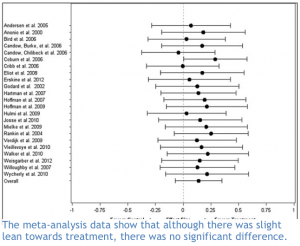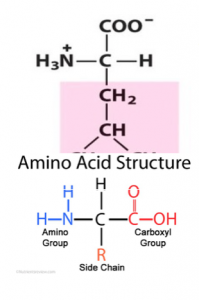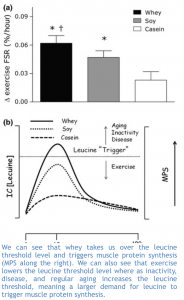Protein Quality Dictates Recovery, Not Timing

Evan Stevens
 “Oh, I’m sore today.” “I feel like it’s getting harder to work out every day like I used to.” “I don’t feel like I am recovering after a workout.”
“Oh, I’m sore today.” “I feel like it’s getting harder to work out every day like I used to.” “I don’t feel like I am recovering after a workout.”
These are the three most common complaints I hear from my parents after they’ve had a hard workout these days. They feel as though their muscles just aren’t there anymore, they are feeling weak the day after a workout, and they are taking longer to recover. They’ll whine and lament, “Oh Evan, what am I to do? I’m getting old.” Well, I usually recommend looking after their recovery protocols, chiefly among them is their protein consumption.
Our Muscles Take A Beating
When we work out at higher intensities (like when we do our high intensity interval training that we know and love here at Forever Fit Science) our muscles take a beating. They breakdown, undergo stress, little micro tears form in the fibres. The soreness you experience after a workout is partially due to these micro tears in your muscle fibres. Muscle breakdown from work isn’t necessarily a bad thing; it is how muscles grow. These micro tears act a signal to the body to put resources into the area to build up new, and more muscle fibres. Just as repeated abrasions against our skin causes larger, thicker patches of skin to form (calluses), so too will our muscles grow thicker and larger, a process called hypertrophy.
Looking for a high quality, natural protein supplement? ForeverFitScience recommends Orgain Organic Plant Based Protein Powder.
Muscles Need To Grow And Repair
To grow and repair, the body recruits amino acids, the building blocks of proteins. If the body doesn’t have enough protein available it takes longer to repair these micro tears and is why we often talk about supplementing with protein post workout. Science has for years told us that we need to be exacting with the timing of supplementation post workout to have the greatest benefit. Elite athletes dedicate a huge amount of time and resources into understanding the best way to supplement with protein to promote optimal muscle strength and growth.  Until recently, it was believed that for a short period of time immediately post workout, the potential for muscle protein synthesis was highest and that the muscle would benefit most from additional protein supplementation during this time. The consensus was that for roughly an hour after exercise this high muscle protein synthesis potential persisted.
Until recently, it was believed that for a short period of time immediately post workout, the potential for muscle protein synthesis was highest and that the muscle would benefit most from additional protein supplementation during this time. The consensus was that for roughly an hour after exercise this high muscle protein synthesis potential persisted.
Enhance the intensity of your workout with HyperWear Gear and save space with their SandBell Weights.
Recent Studies
Recent studies have started to dispute this long-held idea. A recent meta-analysis (a study that evaluates multiple other studies to come to a conclusion) published in the Journal of International Society of Sports Nutrition collected data on both muscle strength and overall muscle hypertrophy (growth) and how they were affected by the timing of protein intake.
In all the studies the test subjects consumed something similar to 20g of protein (whey, soy, and casein were all used as a protein source in the studies looked at in the meta-analysis) either immediately post workout or within the first 20 minutes post exercise. Yet the results consistently showed that there was no significant difference in either muscle strength or hypertrophy between the subjects that took the protein and the control subjects given a placebo (usually a sugar mixture) when the researches controlled for differences between studies/confounding variables (anything that might lead to false associations such as differences in protein quantities and types or study design).
Whey protein is a great source of protein. We recommend Optimum Nutrition Gold Standard 100% Whey Protein Powder
The Surprising Results
Following the long held belief that protein immediately post exercise would yield increased muscle strength and growth, the results of the studies as well as the meta-analysis are somewhat hard to swallow, especially as an athlete – was I lied to?
Additionally, if you aren’t working hard enough, protein timing means relatively little in terms of muscle hypertrophy, further casting doubt on the importance of protein intake immediately post exercise.
“Additional studies have shown that protein timing means relatively little in terms of muscle hypertrophy if you aren’t working hard enough as well, further casting doubt on the importance of protein intake immediately post exercise.”
A study in the Journal of Physiology showed that nutrient-driven changes to muscle protein synthesis were short, about an hour and a half in duration, even though there was an abundance of amino acids still available for use. Amino acids are the basic components of proteins. Many by combining long chains of amino acids we get something called peptides, which fold and group up to form different enzymes, and for this article’s importance, muscle. Free amino acids when the muscle is in need of repair means that muscle protein isn’t being created quickly enough. Protein intake coupled with low-intensity activity, muscle protein synthesis levels were still low. It seemed that coupled with higher intensity exercise (such as maximum-load resistance exercise, or better yet, a HIIT regimen), the drive for muscle protein synthesis remained high 24 hours post exercise and beyond. Working out harder prolongs the window of muscle protein synthesis.
 Working out hard can lead to fatigue and risk of injury. Recover faster from high-intensity workouts with the combination of cold therapy and massage made possible by the Recoup Fitness Roller.
Working out hard can lead to fatigue and risk of injury. Recover faster from high-intensity workouts with the combination of cold therapy and massage made possible by the Recoup Fitness Roller.
What about Carbohydrates?
An additional note: the study went further to show that carbohydrates had no impact on muscle protein synthesis; muscle growth was controlled solely by the availability of essential amino acids. Again, this in contradiction to many previous studies suggesting that carbs were an essential part of muscle growth post workout. So it would seem as though nutrient sufficiency and not timing is what we really need to consider for optimal post-workout muscle recovery.
But what are the sufficient nutrients?
It seems as though the essential amino acids are the main necessity for muscle protein synthesis. We know that amino acids are the building blocks for proteins; of them there are roughly nine that are considered essential (some are conditionally essential based on our life stage and other factors). These nine amino acids cannot be made by our bodies; we can only get them through our nutrition – thus making them essential. Researchers have cast a keen eye at these essential amino acids and how they relate to muscle growth, strength and recovery and have discovered that it is really only one essential amino acid that spurs muscle protein synthesis: leucine. 
All amino acids follow the same basic structure: amine group (nitrogen-containing), middle carbon with a variable “R” group side chain, and a carboxyl group (a weak acid made of carbon, hydrogen, and oxygen). Amino acids are different and hold different properties based on what their “R” group is made of. The most basic, glycine, has a single hydrogen as its “R” group, and the more complex amino acids, such as tryptophan, which has carbon ring structures as its side chain. Leucine is what we call a branched-chain amino acid (BCAA). A BCAA is called as such because its side group is a branch, or string of three of more carbon atoms. BCAAs are drivers of metabolism and cell signalling, but more importantly, they seem to be the only true amino acids that are burned during exercise.
It is for these reasons that researchers turned to them to look at what is spurring muscle protein synthesis. And from the studies, it seems as though leucine is the key.
What Is A Sufficient Source of Protein?
 There seems to be a threshold level of blood leucine that needs to be reached to trigger muscle protein synthesis. Once there is enough leucine in the blood, muscle protein starts. Studies have suggested that about 2.5 grams of leucine intake is needed to trigger a growth response from the muscle. And from this we can deduce the sufficient source of protein too.
There seems to be a threshold level of blood leucine that needs to be reached to trigger muscle protein synthesis. Once there is enough leucine in the blood, muscle protein starts. Studies have suggested that about 2.5 grams of leucine intake is needed to trigger a growth response from the muscle. And from this we can deduce the sufficient source of protein too.
Whey Protein Powder is the best source of protein simply because it has the highest amount of leucine. Whey has enough leucine to reach the leucine threshold and trigger muscle protein synthesis. And here is the real kicker – the fitter you are, the less leucine you need to trigger muscle recovery. The fitter you are, the less you need to build and strengthen muscles, and it creates cyclical pattern of benefits. That said, the opposite is also true; the less fit you are, the more it is going to take to trigger muscle growth. We already learned that higher intensity exercises improves more muscle protein synthesis, and now we know that the fitter we are, the less leucine is needed to start muscle protein synthesis. It is a perpetual cycle of fitness it would seem – work harder to improve muscle size and strength, get fitter, then you need less leucine to spur further growth. It takes less to get more as you get fitter.
Related Article: How Much Protein Do Women Really Need?
Looking for a suspension system for the home? Check out TRX’s awesome suspension systems.
Quality And Sufficiency Wins
With this knowledge in hand, we can start to make changes to our recovery protocols. No more feeling like you aren’t recovering, or feeling like you aren’t working out at your full potential every workout. We have the knowledge and tools to ensure that we can build and strengthen our muscles and ensure proper recovery.
We now know that timing isn’t everything – it is quality and sufficiency.
Take Home Points
- Muscle growth and strength is dependent quality and type of protein, not the timing.
- Muscle protein synthesis can be triggered in excess of 24 hrs after high-intensity exercise.
- BCAA leucine is the trigger for all muscle growth and strength. 2.5 leucine is optimal amount post workout to reach trigger for the average person.
- Whey has the highest leucine account, greater than casein or soy. 20 grams of whey is roughly 2.5 grams of leucine, the optimal amount.
- The more intense your workout, the easier it is to trigger muscle protein synthesis. The fitter you are the less leucine it takes to trigger muscle protein synthesis.
So mom and dad, please start taking in some Whey Protein Powder post workout. Please stop doing just an hour on the bike or the elliptical. Please be a bit more intense sometimes. Please take some Whey Protein Powder
post workout, or supplement with BCAA tablets that have high leucine content. Please stop complaining about how sore you are when you now know how you can help your muscles recover and become stronger.
Related Article: Fat, Carbs, Protein and Recovery. Is There A Silver Bullet?
You Might Like:
How Prolonging Your Athletic Career Impacts Longevity
Evan Stevens Athletes are put under a microscope from the moment they take their first steps into the limelight. Statistics track their every move, from strict performance metrics such as save percentages, shots on goal,...Reaction Time Test: Improving Your Time
Evan Stevens Aging sucks. While some argue that aging is a wonderful part of life, that it gives us experience and allows us to better know ourselves, at the end of the day, it really...Relative Energy Deficiency: Nutrition For Endurance Athletes
Evan Stevens Speak with any endurance athlete and the topic of conversation almost always steers towards nutrition. Endurance athletes are the pickiest, most finicky bunch you will ever meet, from the over health conscious “I...The 7 Myths of Weightlifting
Evan Stevens There are common utterances when the conversation shifts to weightlifting and why people don’t do it. More so than any other form of exercise, lifting has a near infuriating amount of misinformation and...What is a High-Intensity Interval Training (HIIT) Workout Anyway?
Evan Stevens High-Intensity Interval Training (HIIT) is a huge ‘hit’ with exercise researchers and the general population alike. It is less time consuming and can imbue the same if not more benefits as traditional exercises...Do Ketogenic Diets Reduce Anaerobic Performance?
Evan Stevens Ketogenic diets have come to the forefront of popular health fads in the past few years. Placing the majority of our health and dietary problems on carbohydrates (due to the spike in blood...References
Atherton, P. J., and K. Smith. “Muscle Protein Synthesis In Response To Nutrition And Exercise”. The Journal of Physiology 590.5 (2012): 1049-1057.
Phillips, Stuart M. “A Brief Review Of Critical Processes In Exercise-Induced Muscular Hypertrophy”. Sports Medicine 44.S1 (2014): 71-77.
Schoenfeld, Brad, Alan Aragon, and James W Krieger. “The Effect Of Protein Timing On Muscle Strength And Hypertrophy: A Meta-Analysis”. Journal of the International Society of Sports Nutrition 10.1 (2013): 53.
Tang, J. E. et al. “Ingestion Of Whey Hydrolysate, Casein, Or Soy Protein Isolate: Effects On Mixed Muscle Protein Synthesis At Rest And Following Resistance Exercise In Young Men”. Journal of Applied Physiology 107.3 (2009): 987-992.












